- Home
- William Kennedy
Billy Phelan's Greatest Game Page 16
Billy Phelan's Greatest Game Read online
Page 16
“Why you bringing that up now?” Billy asked. “You thinking about marriage again?”
“I’m always thinking about marriage, with you.”
“Drop it, Ange. I’ll never be any good in that husband racket.”
“And you couldn’t, wouldn’t marry a divorcee.”
“The hell with that stuff.”
“I’m only teasing, Billy I love to tease you.”
Angie stood up and slipped back into her nightgown, sheer white silk with white lace trim where her cleavage would’ve been if she had any. She was a long, lean, dark-haired Latinesque girl of twenty-five who looked thirty when she talked because she was smart but who grew wispy with a turn of emotion and fled into the look of adolescence. She read sad poetry and went to sad movies in order to cry, for crying at trouble, she told Billy, was almost as good as weeping with love. There was so little love in the world, she said, that people needed substitutes. It’s why lonely old people keep pets, she said. Billy was Angie’s pet. I can’t imagine anyone who didn’t sometime want to do away with themselves because of love, she once said to Billy, for chrissake. Billy, she said, stroking him, tickling the back of his neck, if you ever died I’d make sure they put flowers on your grave forever, just like they do for Valentino. This, of course, is just what Billy needs.
But Angie was part of his life now, and had been since her husband slapped her around in the Clubhouse at Saratoga. Billy was watching from the bar when they started their screaming over the car keys. Give ’em to me, you bitch, he said. I haven’t got ’em, Angie said. You got ’em, he said. You just wanna hang around here makin’ moon eyes at all the studs. Billy was her only stud then, and when her husband was around, she never even gave Billy a nod. So she walked away from the son of a bitch when he said that, and he spun her around by the arm and slapped her twice. Billy wanted to hit him till his teeth fell out, but all he could do was watch. Angie took the whipping and didn’t say a word, which beat the bastard. He slammed out of the Clubhouse and left their car in the lot and walked back to the hotel. And found the car keys in his own coat pocket when he was halfway there. Billy bought Angie a drink and smooched her on the cheek where she’d been hit and put her in a taxi and bet twenty on a horse named Smacker in the last race and it showed eight dollars.
Angie came to Albany every other month after that, for a weekend at least and sometimes a week. She’d call Billy and he’d see her and once in a while she’d give him money, which made him feel like a gigolo, but of course that wasn’t what Billy was. He only took it when he needed it. Angie called Billy her little wheel of excitement. When I was a kid I used to sit on the stoop and wait for it to roll down the street to me, she said. But it never showed up till I met you.
Why’d ya marry that bum? Billy asked her once, and she said, Because he was like my father and I loved my father, but you’re right, he is a bum, he’s not like my father at all. He’s a bum, he’s a bum, and he’s got his women, too. He came home one night with the smell of oral sex on his face. Angie never called him on it. She just packed a bag and came to Albany. But he was good in bed, Angie said, he was very good. Angie never told Billy he was very good in bed, but then he didn’t hear any complaints out of her either. What got Billy about Angie was the way she was alone so much. Billy was almost never alone. I can stand being alone, Angie told him. Being with him is like being alone. It won’t kill you.
Billy looked down on the lights of Pearl Street. No traffic.
“You got aspirin?” he asked Angie. “I got a headache.”
“The closet shelf on the left, a small bag,” she said. “Why have you got a headache? You never get headaches.”
“Whataya mean I never get headaches? Everybody gets headaches. How the hell do you know I never get headaches?”
“All right, you get headaches,” Angie said, and she fell back into bed and crossed her feet.
In the closet, Billy looked at her picture hat, black with two white flowers. Billy snatched the hat off the shelf and waved it at her. “When you got a face like you got, you don’t need any flowers on your hat.” He put the hat back on the shelf and felt for the aspirin and found them. Then he saw her black linen suit with the plaid scarf, and the gray wool suit with the darker gray silk lapels. Goddamn Angie knew how to dress. Like a model. Too goddamn smart. A college dame. Thinks like a man.
“You’re too goddamn smart,” he said, as he went to the sink.
“What does that mean?”
“The hell with it.”
“Billy, come here. Come and sit down.”
“Gimme a rest.”
“Not that. Just come and sit.”
Billy washed his aspirin down and went and sat. She stroked his face and then dropped her hand and eyes and said, “I’ve got something sad to tell you.”
“Your cat got run over.”
“Something like that. I had an abortion.”
“Yeah?”
“It was ours.”
Billy smoked a little and then looked at her. Her eyes were on him now.
“When?”
“About three weeks ago.”
“Why didn’t you ring me in on it?”
“What would you have done?”
“I don’t know. Helped you.”
“Helped get it done? A good Catholic boy like you?”
“I mean with your head. It must’ve been lousy for you.”
“You never want to know things like that. Anything that involves you. You really didn’t want to know, did you?”
“Half of it’s my kid.”
“Not a kid, a fetus. And it’s gone. Nobody’s now.”
“Goddamn it, I had a right to know.”
“You had a right?”
“You bet your ass. What the hell, I don’t have a say in my own son?”
“Of course it was a boy. You’re really classic, Billy.”
“Whatever the hell it was.”
Billy looked at his hand and saw the cigarette shaking. Goddamn ton of goddamn bricks. He’d wanted to talk about the Berman business and about his father being back in town. Angie had good sense. He wanted to ask her about money, maybe borrow some, but they got into the sack too fast. You can’t ask for money after you’ve been in the sack with a woman. Now, with this business, he couldn’t ask her anything. How do so many things happen all of a sudden? He thought of making nineteen straight passes at Slicky Joyce’s in Mechanicville. Almost broke the Greek bankrolling the game. How do nineteen straight passes happen? He stubbed out his cigarette and walked across the room to put on his pants.
“Why are you putting on your pants?”
“I got chilly.”
“No. You’re ashamed of the part of you that made me pregnant and now you want to cover yourself and hide.”
“You know everything about me. My headaches, why I put on my pants. Goddamn it cut it out!” Billy screamed. “You don’t know the first goddamn thing that’s going on with me. You think I’m a goddamn moron like your goddamn dummy husband?”
“All right, Billy. Don’t get violent.”
“Violent? You kill my kid without even asking me about it. Who made you the butcher?”
“Don’t get like this, Billy. I’m sorry I started it this way.”
“Started?”
“I’m pregnant.”
“Oh, Christ Jesus, what is this game?”
“I wanted to see if you wanted the baby.”
“Hell no, I don’t want no baby.”
“So now it’s different.”
Billy put on his shirt, unable to speak. He folded his tie and put it in the pocket of his coat, which hung on a black bentwood chair. He sat on the chair and stared at Angie.
“I can take care of it,” she said. “I already slept with Joe when I found I had it, just so I could tell him it was his. But I’d never raise it with him. All he wants to raise is money. But I would keep it and give it all the nannies and private schools a kid’d ever need. The only thing it wouldn�
�t have is a real father.”
She stood up. “Or I could put it up for adoption.”
“No,” Billy said.
She came across the room and stroked his face. “Or we could raise it together, somehow. Any way you wanted. I don’t mean marriage. I’ll go away and have it, and you can come and see us when you want to. The only problem is that if my husband figured it out, he’d probably have all three of us killed. But I don’t care, do you?”
“No. Of course not. What the hell do I care?”
Billy walked away from her and sat in the armchair and looked at her standing there barefoot in front of him, the shadow of her crotch winking through the silk nightgown.
“Or you can claim it any time you want, and we could go off then. I’ve got plenty of my own money. I wouldn’t need alimony.”
Billy shook his head. “I don’t buy it. All this shotgun stuff can go to hell.”
“Then you want me to get rid of it?”
“No, I don’t want that. I think you oughta have it.”
“But you don’t want anything to do with it?”
“I’ll do something.”
“What?”
“I’ll go see it.”
“Like a cocker spaniel? Why shouldn’t I get rid of it?”
“By myself, I don’t want to hurt nobody. If you do it, it’s you and I can’t say don’t. I don’t even want to know about it.”
“That’s as far as you go?”
“If you have it, I’ll say it’s mine.”
“You’ll do that?”
“I’ll do that, yeah.”
“Even if Joe says he’ll shoot you?”
“He shoots me, he’s got big trouble.”
“I didn’t expect this.”
“I’d do it for any kid. You let him into the action, he’s got to know who his old man is.”
“It’s for the kid, not me?”
“Maybe some is for you.”
“Birth certificate, baptism, that whole business?”
“Whatever you want.”
“I really didn’t think you’d do this. You never committed yourself to me on anything. You never even answered my letters.”
“Letters? What the hell am I gonna do, write you letters and have you fix up my spelling?”
“I wouldn’t do that. Oh God, I love you. You’re such a life-bringer, Billy. You’re the real man for me, but you’re the wrong clay.”
“Clay?”
“You can’t be molded. Sex won’t do it and money won’t. Even the idea of a kid wouldn’t. But you did say you’d go along with me. That’s really something.”
“What do you mean the idea of a kid?”
“There’s no kid.”
She was rocking from foot to foot, half-twisting her body, playing with the ends of her hair.
“You did get rid of it.”
“I was never pregnant.” She smiled at Billy.
“Then what, what the hell, what?”
“I needed to know what you felt, Billy. You really think I’m dumb enough to let you knock me up? It’s just that we never talk about things that really matter. This was the first time we ever talked about anything important that wasn’t money or my goddamn husband. I know almost nothing about your life. All I know is I love you more now than I did when you walked in the door. I knew I wanted you even before I met you.”
Billy was shaking his head. “Imagine that,” he said. “You conned me right out of my jock.”
“Yes, I know.”
“What a sucker.”
“Yes, it was lovely. You were wonderful. Now will you take me out for a sandwich? I missed dinner waiting for you.”
“Sure. But first get busy with the douche bag. And I’m gonna watch. I’m not going through this noise again.”
“Ah, Romeo,” Angie said, massaging Billy’s crotch.
Martin, thinking of his father, of Charlie Boy, of Noah, all spread-eagled on their beds, of Melissa spread-eagled naked in fatigue on the floor of her suite at the Hampton Hotel, failed to sleep. He faced downward and leftward into the pillow, a trick he played on the fluids of his brain that generally brought sleep, but not now. And so he faced upward, rightward. He closed his eyes, fixating on a point just above his nose, behind the frontal bone, trying to drive out thoughts as they appeared.
But this also failed, and he saw the lonely, driven figure entering the wholly darkened tunnel, so narrow no man could survive the train should it come roaring through before he reached the far exit. He would be crushed by the wheels or squeezed to juice and pulp against the wall. The figure reached the trestle that spanned the bottomless canyon and began to inch across it on hands and knees, fearful of falling, fearful the train would come from beyond the forest curve and bear down on him at mid-trestle. No chance then for backward flight, no chance to sidestep, only to hang from trestle’s edge by fingertips. Would vertigo then claim him? Would his fingers hold him?
He sat up and lit the bedside lamp and began to count the ceiling panels again, eleven horizontal, twelve vertical. He multiplied. One hundred and thirty-two panels, including fragments. He counted the sides of the dresser, the number of edges on the six drawers: twenty-four. He counted the edges on the decorative trim on Mary Daugherty’s closet. He totaled the edge count: two-seventy-eight. He counted the edges on the ceiling molding. He counted the backs, fronts, and sides of books on his dresser. He lost track of the total.
He could never contain the numbers, nor did he want to. He usually counted sidewalk cracks when he walked, telephone poles when he drove. He remembered no totals except the eighteen steps to the city room, twelve to the upstairs of this house, and remembered these only after years of repetition. If he miscounted either staircase, he would recount carefully on the return trip. He once viewed the counting as a private way of demarcating his place in the world, numbering all boundaries, four counts to the edge of a drawer, four to the perimeter of a tile, an act of personal coherence. On the day he awoke and drawer edges were worth three, tile perimeters five, he would know the rules of his civilization had been superseded.
He switched off the lamp, closed his eyes, and found a staircase. He climbed it and at the turning saw the hag squirming on the wide step, caught in an enormous cobweb which covered all of her except her legs. Beneath her thighs, two dozen white baby shoes were in constant motion, being hatched.
I don’t like what everybody is doing to me, she said.
The hag reached a hand out to Martin, who fled up the stairs in terror, a wisp of cobweb caught on his sleeve.
He plucked himself from the scene without moving and felt panic in his heartbeat. He said the Our Father, the Hail Mary, the Confiteor. Deliver us from evil. Blessed is the fruit of thy womb. Mea maxima culpa. He had not prayed in twenty-five years except for knee-jerk recitations at funerals, and did not now believe in these or any other prayers. Yet as he prayed, his pulse slowly slackened, his eyes stayed closed. And as he moved into sleep, he knew that despite his infidel ways, the remnants of tattered faith still had power over his mind.
He knew his mind had no interest in the genuineness of faith, that it fed on the imagery of any conflict that touched the deepest layers of his history. Years ago, he’d dreamed repeatedly of hexagons, rhomboids, and threes, and still had no idea why. He understood almost none of the fragmented pictures his mind created, but he knew now for the first time that it was possible to trick the apparatus. He had done it. He was moving into a peaceful sleep, his first since the departure of Peter. And as he did, he understood the message the images had sent him. He would go to Harmanus Bleecker Hall and watch Melissa impersonate his mother on stage. Then, all in good time, he would find a way to make love to Melissa again, in the way a one-legged man carves a crutch from the fallen tree that crushed his leg.
The fountain cherub, small boy in full pee, greeted Martin as he walked through the Hall’s foyer. Psssss. The Golden Bowlful, by Henry Pease Lotz. Martin remembered seeing Bert Lytell here, the Barrymo
res and Mrs. Fiske strutting on this cultural altar. He saw the young Jolson here, and the great Isadora, and when he was only thirteen he saw a play called The Ten-Ton Door, in which a man strapped to that huge door was exploded across the stage by a great blast, an epic moment.
“So you made it,” said Agnes, the hennaed gum chewer in the Hall’s box office. “We expected you last night.”
“I was up in Troy last night,” Martin said, “walking the duck.”
“The duck?”
Martin smiled and looked at his ticket, B–108 center, and then he entered the Hall, a quarter century after the premiere that never was. Edward Sheldon’s Romance premiered here in 1913 instead of The Flaming Corsage, and Sheldon’s reputation blossomed. But when the priests and Grundys killed Edward Daugherty’s play, calling it the work of a scandalous, vice-ridden man, they made Edward a pariah in the theater for years to come.
In 1928, a bad year for some, Melissa set out to convert the play to a talking picture in which she would star as the mistress, her long-standing dream. She wanted Von Stroheim to direct, appreciative of his sexual candor, but the studios found both the play and the scandal dated, and dated, too, Melissa, the idea of you as a young mistress.
Aging but undauntable, Melissa turned up then with something not so old: Edward Daugherty’s journal from the years just before and just after the scandal, full of the drama and eroticism of the famous event, in case, chums, you can’t find enough in the play. Still, no studio was interested, for Melissa was a fading emblem of a waning era, her voice adjudged too quirky for talkies, her imperious and litigious ways (when in doubt she sued) too much of a liability for the moguls.
And so The Flaming Corsage continued unproduced either as play or film until the Daugherty renaissance, which began with an obscure New York mounting of his 1902 work, The Car Barns. George Jean Nathan saw that production and wrote that here was a writer many cuts above Gillette, Belasco, Fitch, and others, more significantly Irish-American than Boucicault or Sheldon, for he is tapping deeper currents, and superior to any of the raffish Marxist didacticists currently cluttering up the boards. Was this neglected writer an American O’Casey or Pirandello? Another O’Neill? No, said Nathan, he’s merely original, which serious men should find sufficient.

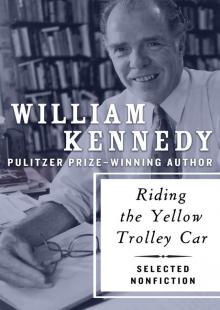 Riding the Yellow Trolley Car: Selected Nonfiction
Riding the Yellow Trolley Car: Selected Nonfiction Changó's Beads and Two-Tone Shoes
Changó's Beads and Two-Tone Shoes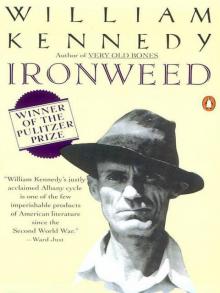 Ironweed
Ironweed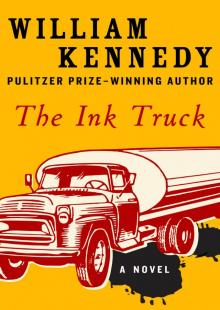 The Ink Truck
The Ink Truck Billy Phelan's Greatest Game
Billy Phelan's Greatest Game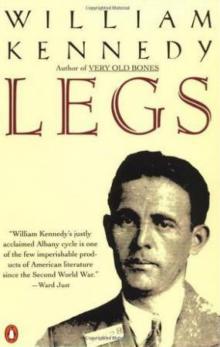 Legs
Legs Very Old Bones
Very Old Bones The Last Mission
The Last Mission The Flaming Corsage
The Flaming Corsage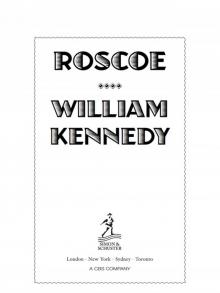 Roscoe
Roscoe Quinn's Book
Quinn's Book Ironweed (1984 Pulitzer Prize)
Ironweed (1984 Pulitzer Prize)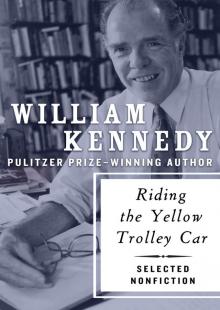 Riding the Yellow Trolley Car
Riding the Yellow Trolley Car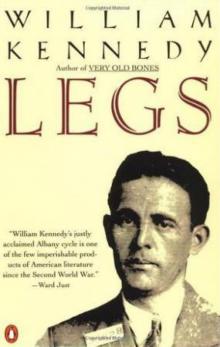 Legs - William Kennedy
Legs - William Kennedy